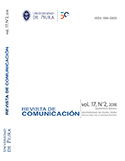
We present the second edition of the Revista de Comunicacion included on the Scopus Database. With this guarantee we assume the challenge of maintaining quality and prioritizing the relevant themes of communication, as a changing reality, with essence and social transcendence.
The rhythm of change continues. New and emerging technologies like artificial intelligence and virtual reality continue to redefine the field of communication. However they’re not everything. The last forecast from the North American consultancy firm PriceWaterhouse Coopers, “The Global Entertainment-Media Outlook 2018-2022”, predicts that convergence 3.0, connections and trust are trending for this 5 year period. For future success, they say, appropriate technologies, and excellent content, delivered at a cost-effective level will be needed to engage that audience that already relies on media and entertainment companies. We affirm that trust is becoming a vital differentiator in the digital world.
The articles focus on the areas of journalism, movies, technology, advertising and corporate reputation. They belong to 33 researchers of 17 universities from Spain, Mexico, Argentina and the United States.
The world of journalism is still in the spotlight. In the event Media Party 2018, Jeff Jarvis, a professor of the University of New York, reminded people of how important it is that media listen to its audience and that the audience becomes a bridge to create positive change in society. The journalists, designers and developers will meet there to work together for the future of media. Data journalism and new narratives were among presented topics.
From this perspective, the digital media professor, J. Flores analyzes the data journalism revolution and proposes a quick adaptation to the new informative model in the university. The binomium Journalism + Scheduling, and learning about algorithms are in process. Around the digital information production, the researchers M. Benites and S. Herrera analyze the diverse journalistic narrative and expressive possibilities that 360° immersive reporting video provides in Spanish media.
The frames are in the current agenda. Antoni Gutierrez, professor of the Master of Political Communication from Universitat Ramon Llull, recently referred to the risk of falling into the “Trump frame”. Focusing on the journalistic "frames", the russian linguist T. Mukhortikova analyzes how the newspapers El País, The Guardian and Izvestia, from the metaphor as a framing vehicle, covered the news about the 11M attacks. Attending to the way the news are treated, Spanish researchers A. Arrese et al. analyze the opinions of political and experts sources of the coverage of the housing bubble in the Spanish press (2003-2013) and reflect that the media may or may not favor a dominant government position around a relevant social issue. The radio also maintains its coverage: the experts of this media, P. Martinez-Costa and M. Müller analyze the genres of the prime time programs of the Argentine radio.
In the field of the seventh art, professor M. De la Torre is interested in the theatrical adaptations of Cocteau, Williams and Lorca in the cinema of Pedro Almodóvar; and professor R. Gutierrez, from the epistemological considerations on the cognitive value of fiction, which brings us closer to the relationship between human praxis and fiction: this is how we relate representation and what is represented in the series.
In the environment of technology, the existing digital divide and the insufficient use and exploitation of the web are worrying. The Director of the World Wide Web Consortium Tim Berners-Lee, seeks to connect the other half of the world, disconnected, with this vision of making sure that the Web works for people. From that perspective, the mexican researchers M. Padilla and N. Medina question the unsuccessful efforts in ICTs and the development of young people, and propose a turn of the technological-informational paradigm towards the recognition of the young person, capable of committing himself to sustainable development. In turn, the researcher J. Mas analyzes the communication of Spanish museums on Facebook, with the purpose of making better use of social networks in interaction with users and in the conversion of a physical museum into a "complementary social museum".
In that "global village" for all, M. Jiménez and J. Álvarez evaluate whether the websites of the Andalusian dioceses fit their institutional objectives and the needs of their users. And professors F. Suárez-Carballo et al., analyze the typographical features of the base text in Spanish digital newspapers.
Brands continue to innovate. Advertising specialists A. Mendiz Noguero et al., study the series Tender Stories (2014-2017) of the Tous house, which has positioned the brand around value and the concept of tenderness and love. The analysis of the storytelling, designed in transmedia narrative, is made from the "first and second navigations", proposed by professor García-Noblejas. Likewise, M. Pretel, et al. propose a study on the emotional value of Apple and Samsung brands using three components: affection, passion and connection with brands.
The corporate reputation is taking back its space. The teachers A. Andreu et al. have made a critical revision about the treatment given by Sustainability Indexes to the corporate governance dimension and propose the inclusion of the most appropriate variables to transmit reliability, trustworthiness and truthfulness.
The professors M. Gutierrez-Rentería et al. examine the indicator of social capital in mexican universities, looking after their civic participation, interest in politics, trust in institutions and the interaction in traditional and digital media.
We invite you to contribute with scientific research, that study the global communicative phenomena in depth.
The editor
